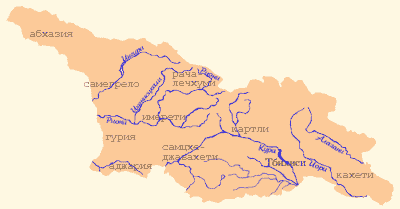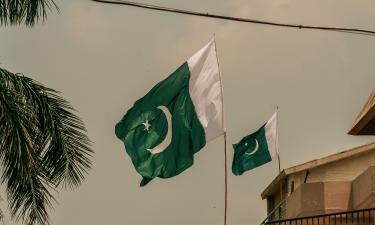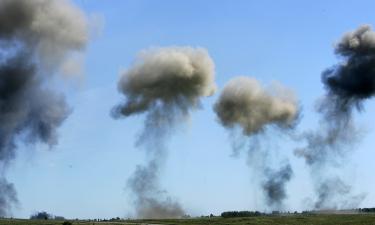Another Georgia to appear on the US map
The Georgian opposition does not want its leadership to be the puppets of the Kremlin or Washington; they want the authorities to pursue policies based on Geogia's national interests
Political confrontation between Georgia and Russia has recently abated. Speeches and statements by Georgian President Mikhail Saakashvili and representatives of “the party of war” in the government and parliament became less belligerent following US President George W. Bush's visit to Georgia. Tbilisi interprets the long-awaited arrangements on the withdrawal of Russian military bases from Georgia as a breakthrough of the Georgian diplomacy. Meanwhile, Moscow and Tbilisi are still in disagreement on a few key issues. Several Russian and Georgian experts believe that Georgia may lose its sovereignty if “the young revolutionaries” do not change the direction in terms of international and domestic policies. As regards the decision-making, the Tbilisi authorities can be hardly independent these days. 
“There are a number of signs showing that today's Georgia is not and can not be an independent entity of international relations,” says Alexander Chachia, one of the former co-chairmen of the Georgian party Edinstvo (Unity). Even the leader of the Georgian party of refugees Boris Kukubava who usually blames Russia for almost any kind of trouble Georgia has run into over the last few years, even he admits that there is no power in Georgia at the moment. “Those in power today have been put on the US payroll, some Russian oligarchs, politicians, and security agencies helped them pull off the scheme,” says he.
Sergei Markov, chairman of the National Civil Council for International Affairs, points out that the formation of a state system in Georgia is meeting with lots of difficulties since every new Georgian leader would first seize power by force and later would make himself legitimate by winning election. According to Mr. Markov, there are problems with democracy in Georgia with regard to electronic media. All four main TV stations are now state-controlled, one of the opposition TV stations changed hands with the help of policemen armed with submachine guns. Besides, the Georgian authorities are now using methods for maintaining control over information space. The methods were originally tested in Ukraine under Leonid Kuchma They are based on covert instructions on what or who to cover and what or who should be banned from the air. In the meantime, methods used for fighting corruption are totally illegal. The dependence of the judiciary on the authorities grew considerably. The law enforcement agencies are financed out of extrabudgetary funds. There are no representatives of national minorities in power orpolitics. In view of the above, there is less democracy in Georgia now than it was under Edward Shevardnadze despite the high-flown statements of the new Georgian leadership about democratic values. Mr. Markov believes that the Georgian political elite still cling to a number of myths which impede the development of Georgia-Russian relations.
“Myth No1: Russia is to blame for everything. This myth stems from the reluctance of Georgians to admit their own mistakes with regard to national minorities i.e. Abkhazians and Ossetians. Myth No2: we will be milking the EU and USA the way we milked Russia in the past. Myth No3: we will be taking advantage of the conflict between Russia and the West. Myth No4 is unfortunately related to Abkhazia and South Ossetia, the Georgians want to force them to their knees. But this plan will not work out.”
The opposition in Georgia is called “the pocket opposition” because it is the only variety existing at the political scene. Anyway, the opposition level its criticisms at tactics and strategy of the powers that be in Tbilisi. “We do not want the Georgian leadership to be the puppets of the Kremlin or Washington, we want the authorities to pursue policies based on Geogia's national interests that should center on ensuring territorial integrity,” says Irakliy Batiashvili, leader of the opposition movement Vpered, Gruzia! (Forward, Georgia!)
Many Russian and Georgian politicians share the opinion on the situation about Abkhazia and South Ossetia. The Georgian authorities effectively turn Abkhazia and South Ossetia down by forcing Russia out of Transcaucasia. “Why on earth would the Americans need Abkhazia as part of Georgia?” There is no oil pipeline out there, and Georgia alone has plenty of runaways. Georgia's national interests are out of the question. The issue relates to the American and Turkish military presence changing the Russian military presence in the region. It should be legalized because it is already in place. This is not some malicious intent on the part of Mr. Saakashvili or the ruling party, this is the fate of a small nation in the modern world where such a nation is doomed to be small change in a geopolitical game played by major world powers, according to Mr. Chachia. He is skeptical that the situation will change should part of the opposition take over after a coup d'etat in Tbilisi. He believes that all the opposition leaders including those inside and outside the parliament were hand-picked by US State Department so no changes are in the wings. Mr. Chachia is confident that Russia should be the salvation of Georgia. He believes that Georgia will perish should Russia lose its grip on the North Caucasus.
Subscribe to Pravda.Ru Telegram channel, Facebook, RSS!




